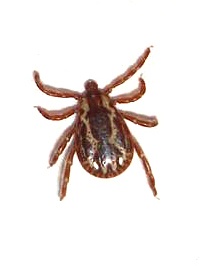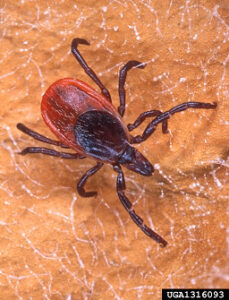RANGER STEVES’ NATURE NICHE
Parasites and Parasitoids
By Ranger Steve Mueller
We have heard much about ticks this year. Fortunately, I have encountered few. The concern is not specifically the tick but they can be quite annoying. They often move to trails where they stand on vegetation and grab onto whatever passes by. They cling to animals and walk on them to a location suitable for sucking blood. It is the female that needs to suck blood to gain protein to nourish eggs.
The small tick will engorge with blood and swell to the size of marble before dropping off. Generally the tick sucking blood is not a health hazard but it is a disturbing nuisance. Ticks are parasites which means they draw energy from a host without killing it.

 Ticks can carry various diseases that can significantly impair the health of the host. The “dog tick” (pictured at left) is most familiar and is easily seen. Much smaller ticks like the deer tick (pictured at right) can carry Lyme disease that can be dangerous to the host health.
Ticks can carry various diseases that can significantly impair the health of the host. The “dog tick” (pictured at left) is most familiar and is easily seen. Much smaller ticks like the deer tick (pictured at right) can carry Lyme disease that can be dangerous to the host health.
Mosquitoes are another parasite where females suck blood and can spread diseases. They can infect dogs with heartworm. I have seen an infected dog that appeared to have had a stroke. The mosquito bite and blood sucking is primarily a nuisance. It is the diseases they can carry that is of greatest concern.
It is wise to empty standing water containers frequently to prevent mosquitos from succeeding in reproduction. Using pesticides is dangerous to wildlife because it eliminates many insects including predatory insects. Pesticides reduce available bird food that is needed to rear young. Bird populations have been declining significantly in recent decades and use of pesticides is one cause. Elimination of healthy habitat is a primary cause for wildlife decline. Well maintained lawns are a death sentence for most wildlife like mammals, birds, reptiles, and essential insects. Allowing portions of the yard to have native plants provides healthy habitat.
Parasitoids are different from parasites. They kill their host. Most thrive on insects and other invertebrates. They are an extremely important biological control for species many people consider pests. In gardens, they control insects that feed on vegetables and ornamental plants. Parasitoids and predatory insects are more susceptible to being killed by pesticides. It is frequently counterproductive to use pesticides because insect pests recover more quickly than parasitoids and predators. The pests then become an increasing problem.
Many parasitoid fly and wasp species lay eggs on a specific insect host species. The parasitoid stings the insect to lay its eggs. The eggs hatch and feed on non-vital host organs while the parasitoid matures. The pest insect continues to live and supplies the parasitoid with nourishment. When nearly mature, the parasitoid feeds on vital organs causing the host to die. The host pest cannot mature to produce more offspring.
Caterpillars can be considered parasites when they eat leaves but they seldom significantly injure the host. Generally we refer them as herbivores like deer that eat leaves. Exceptions causing harm include things like exotic species that often do not have native parasitoids to control them.
 The gypsy moth (pictured at left) is an exotic species that spread and has become a problem. They are currently infesting some oak forests in the region and defoliating trees. Few trees will die as a result but during the infestation massive caterpillar frass (poop) drops making it very unpleasant. Having trees defoliated in July is not desirable. Foresters do not treat forests with pesticides to control them because it costs more to treat trees than it saves for timber harvest.
The gypsy moth (pictured at left) is an exotic species that spread and has become a problem. They are currently infesting some oak forests in the region and defoliating trees. Few trees will die as a result but during the infestation massive caterpillar frass (poop) drops making it very unpleasant. Having trees defoliated in July is not desirable. Foresters do not treat forests with pesticides to control them because it costs more to treat trees than it saves for timber harvest.
Nature niches contain parasites and parasitoids that are natural biological controls similar to birds as natural controls that feed on “pests”. Encourage a healthy environment instead of trying to control it.
Natural history questions or topic suggestions can be directed to Ranger Steve (Mueller) at [email protected] – Ody Brook Nature Sanctuary, 13010 Northland Dr. Cedar Springs, MI 49319 or call 616.696.1753.
Gypsy moth caterpillar photo: Karla Salp, Washington State Department of Agriculture, Bugwood.org
